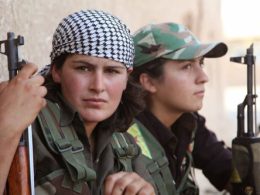Last week, fear and tension escalated on the Korean peninsula and far beyond, for very understandable reasons. North Korea is a quasi Stalinist regime of a peculiar kind and inherently unstable. The new ‘great leader’ – Kim Jon-un – appears to be even more unpredictable than his father when it comes to threats of sending nuclear weapons into the sky.
Does he see the South of the divided peninsula as a major threat to his dictatorial rule – especially its higher living standards and certain basic elements of democracy? Is he trying to demonstrate to others within his own ruling clique, including his aunt and uncle, that he is boss? Is he using the threat of nuclear attack to force a renewal of negotiations in the international “six-party talks”? Is his aim to get international sanctions lifted and more food aid for North Korea’s starving population?
It is probably a mixture of all these. The situation is indeed one in which at any time a nuclear exchange could be set off – deliberately or by accident. It cannot be excluded. It would lead to a human nightmare of death and destruction, the collapse of the regime in the North and a major crisis for South Korea and the whole region.
The initial response of the US to North Korea’s threats has thankfully been “ratcheted down”, as one Yonsei University analyst puts it. After flying B2 bombers over the peninsula, the US has postponed a planned inter-continental missile test and appears to be looking for ‘dialogue’ rather than ‘active deterrence’.
The new leadership in Beijing appears to be less willing than in the past to give automatic backing to the North Korean regime and its periodic sabre-rattling against imperialism and the South Korean regime. On the other hand, in the South, the ‘trustpolitik’ of its new right wing regime means accepting that ‘denuclearisation’ is not the only first step towards the removal of the almost permanent threat from the North.
A factor in the calculations of the regime in the North must be fear that if they surrendered their nuclear capacity, they would suffer a similar fate to that of the Iraqi and other regimes at the hands of imperialism.
Hypocrisy
It is totally hypocritical of the US and China to demand total disarmament of North Korea when they are themselves armed to the teeth with nuclear weapons which they have no intention of de-commissioning. Nuclear armaments are monstrous and fiendish weapons of mass destruction. No sane regime would use them because of the prospect of Mutually Assured Destruction (MAD). They say they are simply deterrents.
But this does not answer the argument that such weapons could be set off by accident or by a deranged head of state. In the case of Korea the new instability has arisen in the aftermath of the previous ’reign’ of Kim Jong-il during which a majority of the population lived in absolute poverty and starvation. The threat of the superior living standards in the south and the ’infection’ of certain hard-won democratic rights, even access to the internet – threaten to undermine the regime in the North. Hence the hyping up by Kim Jong-un of the external threat and the necessity of being ready to use nuclear weapons in self-defence.
The regime in North Korea appears to be a law unto itself. It is in a position, with 600,000 troops just across the ‘cease-fire’ line to obliterate the South’s capital, Seoul, that lies just 37 miles to the South. It has made a number of attacks, for example on South Korean vessels, in the recent past and even this week may launch a missile with a range that would take it as far as the US base of Guam.
China’s support for Pyongyang waning?
In its struggle for hegemony in the region and internally, the ruling ‘Communist’ party in China is not averse to engaging in its own military stand-offs in the region – with Japan, Vietnam and even the US. But on its road to the restoration of capitalism, it will not now automatically come to the aid of its neighbour. The regime in North Korea is by no means communist anyway, even in name. Its ruling ideology, Juche, is an invention of its first ‘leader’ – Kim il Sung, originally a communist and resistance fighter against Japanese rule over Korea. The statelet, with a population of nearly 25 million, resulted from the devastating peninsular war of 1950-53 between the forces of imperialism and those of post-war China under Mao Tse Tung. It ended in a stale-mate with the northern state modelled on Stalin’s Soviet Union and a capitalist south under pro-US military rule.
Today the steady stream of tourists who travel to stare across the De-militarised Zone that divides the country are told by official guides that the “communist wolves” of the north have threatened the democratic South for 60 years. Firstly, although the main bastions of the economy in the North are state-owned, there is no element of democracy for the massively impoverished and hungry population and there is great wealth and privilege for a few at the top of the governing clique and the army. North Korea has been used as a bogeyman against the ideas of communism and socialism but it is a gross distortion of such ideas and bears no resemblance to a democratic socialist workers’ state.
Secondly, in the South, US imperialism poured huge resources in to back ruthless military dictatorships for more than 30 years, including that of Park Cheung-he, the father of the newly elected president. The US has a large arsenal of weapons and tens of thousands of troops based in South Korea. Since Pyongyang’s threat to ‘nuke’ Hollywood (which, so far, it appears incapable of doing anyway), the US has threatened to increase its ‘hardware’ on the peninsula – another reason for China to try and de-escalate the crisis. (In 1994, Bill Clinton’s administration seriously considered invading the North, but was constrained by the estimates of a cost of $100 bn. and a million casualties.)
Chaebol capitalism
The South Korean economy is dominated by a handful of family-run conglomerates or Chaebol. Trade union militants are constantly harassed and imprisoned for exercising the democratic rights to organise and to strike (see article on socialistworld.net 26 February 2013). The struggle to create an independent political voice for the South Korean working class gathers urgency. Because of the monstrous regime in the North which many have been persuaded to falsely associate with socialism, the task of building a genuinely socialist force to fight against big business and the banks in the South remains hard.
Today’s huge discrepancy in living standards between the North and the South means that most in the South see the huge cost of re-unification as being at their expense. Any struggle to re-unite the peninsula in the interests of working people needs to link the struggle against dictatorship and nuclear madness in the North with the struggle against the Chaebol in the South. The struggle for socialist democratic planning of publicly-owned industries, banks and the land would lay the basis for the longed for re-uniting of the peoples of Korea.












